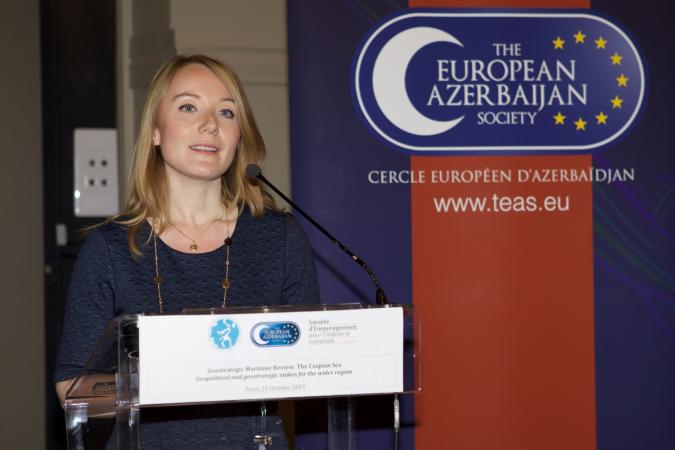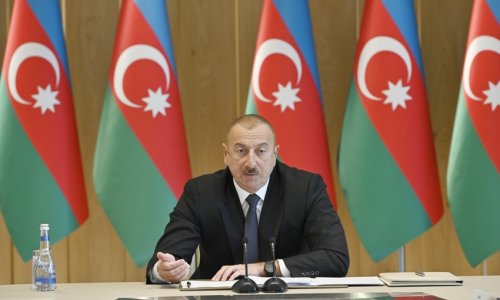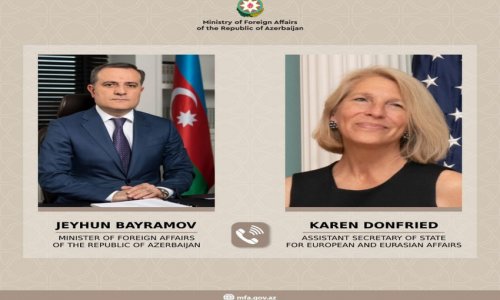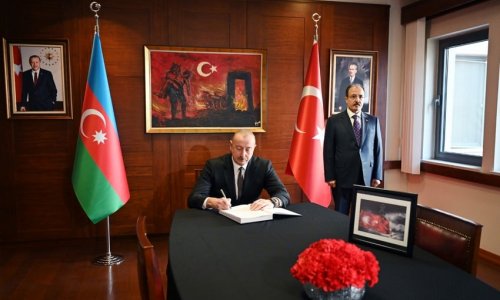In the context of the refugee crisis and changing relationships between the West with Russia and Iran – both of which are neighbours of Azerbaijan – this is a pivotal time for the South Caucasus powerhouse to demonstrate its importance to the region. These were highlighted during a panel discussion in Paris at L’Hôtel de l’Industrie, headquarters of the Société d’Encouragement pour l’Industrie Nationale (SEIN), located near the Sorbonne University and the centrepiece of French industry since 1852. The conference was organised by TEAS, the International Geostrategic Maritime Observatory (IGMO) and SEIN, and attended by over 60 delegates, including H.E. Elchin Amirbayov, Azerbaijani Ambassador to France; H.E. Aurelia Bouchez, incoming French Ambassador to Azerbaijan; and diplomats from the Iranian, Georgian, Russian and Turkish embassies, amongst others.
Azerbaijan is currently in the midst of an energy revolution. The development of the Shah Deniz II full-field development has led to the 3500km, $45bn Southern Energy Corridor, which will see gas piped through the South Caucasus Pipeline (SCP), Trans-Anatolian Pipeline (TANAP) and Trans-Adriatic Pipeline (TAP) to an Italian interconnector, thereby representing supply diversity for much of Europe, away from overreliance on Russian resources. This will initially see up to 16bn m3 (bcm) of gas pumped to Turkey per year, and then Europe, by 2018 and 2020, respectively. The corridor is being constructed at over-capacity, and has the potential to carry up to 31bcm, augmenting Azerbaijani Caspian supplies with those from Central Asia – and possiblyIran – and transforming Azerbaijan into both a supply and transit country.
After Gilles-Henri Garrault, Vice-President: International Relations, SEIN, opened the event, Ellen Wasylina, President, IGMO, presented the special edition of the Geostrategic Maritime Review, which focuses on the Caspian region.
Marie-Laetitia Gourdin, Director, TEAS France commented: "This is an important time to hear about the strategic importance of the Caspian Sea. Azerbaijan is a major partner of the EU, located in the Caspian, and it has established many business and commercial relationships with EU member countries. This publication is a very important addition to the available literature on the country.”
Gulmira Rzayeva, Senior Editor of the Geostrategic Maritime Review – The Caspian Sea; Associate, Oxford Institute for Energy Studies, and Senior Research Fellow at the Centre for Strategic Studies (SAM) under the President of Azerbaijan said: "It is necessary to raise awareness of the countries around the Caspian Sea by organising events of this type in Paris and other capitals in Europe.”
She continued: "Energy is certainly the most important issue in the Caspian region. In the publication, we tried to cover the Caspian from different angles. We included such topics as the Trans-Caspian Pipeline, which has geopolitical implications, in addition to the demarcation of the legal status of the sea. EU countries are key customers for Azerbaijan, as it reduces their reliance on Russian gas. Azerbaijan is developing the Southern Energy Corridor, and this represents an alterative energy source to Russian Gazprom. Liquiefied Natural Gas (LNG) will be particularly important in the future. Iran has the resources, but it will need to produce more gas and oil.”
Dr Efgan Niftiyev, Expert, Hazar Strateji Enstitüsü, who moderated the panel discussion, reiterated this, saying: "The Caspian is taking centre-stage in global geopolitics and is central to the former Soviet space. The West is interested in collaborating with the region in terms of energy security and has been primarily responsible for the development of resources in the region. Now we are seeing local companies involved in the development of the Shah Deniz field and construction of the Southern Energy Corridor.”
Oktay Tanrisever, Professor at METU-Turkey, specialising in Regional Security, Energy and Environment and Turkish Foreign Policy, commented: "The development of the Eurasian Economic Union (EEU) since 2012 has resulted in Russia unleashing its power in the region, and Russia and Kazakhstan – two littoral states in the Caspian Region – are members of the EEU. However, Baku has demonstrated its ability to pursue an independent policy.”
Slavtcho Neykov, Chairman, Energy Management Institute, Bulgaria, said: "All presentations today have focused on security of energy supply. It is also important to take into account the security of demand and infrastructural security. The Southern Energy Corridor will play an important role, but it will initially carry only 16bcm per annum, whereas total EU consumption is 530bcm.”
Sonja Lekovic, Energy Analyst, International Energy Agency, explained: "The Caspian Sea has an important role to play in the world of energy. Azerbaijan continues to pursue an independent policy, is achieving its 2020 objectives, and has achieved a greater reduction in energy intensity of any country in the region, partly due to the replacement of oil with natural gas and the adoption of new, energy-efficient technologies.”
Jane Amilhat, Deputy Head of Russia–CIS Unit, DG Trade, European Commission, continued: "We are in favour of greater economic integration, but this doesn’t really exist in the Caspian Region. The countries need to be integrated with the world monetary market, and Azerbaijan is coming closer to this. The EU is seeking market integration, energy security and supply diversification and hence the Caspian Region is particularly important to us.”
Agathe Thomas, ENGIE Representative in Baku, concluded: "Azerbaijan, Turkmenistan and Kazakhstan account for 13 per cent of the world’s gas reserves. With around 18 per cent of total reserves – making it the top potential supplier of gas – Iran has the potential to become a major export country, and this will be a gamechanger. Azerbaijan is an oil producer with huge ambitions for gas and has the potential to produce 30bcm per annum.”
The evening concluded with a question-and-answer session and cocktail reception for more informal discussions.
www.ann.az
Follow us !











